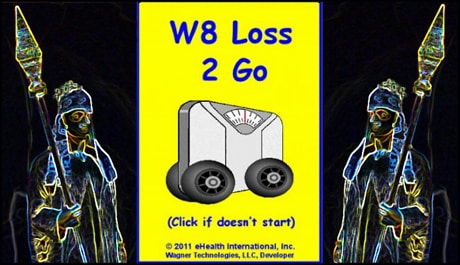
Way back in 1977, visionary writer/director Eric Luke made a short science fiction film called Dark Ages, described thus,
Wandering a post apocalyptic wasteland in search of adventure, a samurai and his talking Cyber spear stumble upon a quest involving his old enemy…
The hero, Jack, is accompanied by this electronic counselor who dishes out advice like, “You might want to get behind something, if you had any brains,” and then plays him a lullaby at bedtime.
Keeping that thought in mind, take advantage of the opportunity to watch and hear the presentation that Dr. Pretlow recently gave to 12 obese kids and their parents, the beta-test group for the “W8 Loss 2 Go” iPhone app. (A slightly different version of the presentation is available as a PDF download.)
The presentation describes the often sad lives of overweight children who revealed their feelings via the Weigh2Rock website. Dr. Pretlow says,
Now, you would think that, as unhappy as these kids were, being overweight, that they would simply have eaten less, exercised more, and lost weight, and not been unhappy any more.
But this just didn’t happen. He tells about the “Aha!” moment when he got the message. If we hope to prevent the young from being drafted into the ranks of the dangerously obese, information about healthy eating is not enough. Passing a test to name the top 10 serious medical conditions associated with obesity is not enough.
Why is it such a monumental struggle for kids to stop eating so much of the wrong kind of hedonic, “more-ish” pseudo-foods laden with fat, sugar, and additives? Dr. Pretlow polled the Weigh2Rock kids to discover the biggest problem foods, and what they have in common — none of them are essential for life.
These substances perform as an anesthetic, a painkiller, to soothe feelings of stress, depression, and boredom. Eating comforts the wounded spirit with the worst kind of false comfort, the kind that does more harm. Kids even hate themselves for comfort eating, but cravings overcome them.
Dr. Pretlow asks, “What’s really going on here?” Looking through the psychological food dependence-addiction lens, it’s apparent that certain foods act like drugs and kids actually get hooked. They start out eating for taste, but the brain likes the anesthetic effect and gets trained into liking it way too much, and the brain itself even changes to keep this going.
The emotional part of the brain lights up at the sight of a chocolate milkshake, and it’s a twisted love story. Kids who recognize drug addiction or alcoholism in others recognize a similar condition in themselves where food is concerned. Some even acknowledge that trying to stay away from it is like trying not to use it like a drug. But getting hooked happens gradually over time, and the process can be interrupted before brain changes take place.
The “W8 Loss 2 Go” iPhone app has two purposes. First, it’s an intervention that focuses on problem foods, to help overweight kids unhook and maintain a healthy weight without getting re-hooked. Second, it provides coping skills to deal with the basic reasons kids get hooked in the first place, showing other ways to handle negative emotions and neutralize cravings.
Food itself isn’t the enemy, but abusing it like a drug is. We expect the young beta-testers will find that the “W8 Loss 2 Go” app is the next best thing to Jack’s science-fictional Cyber spear, a companion to aid in their quest to vanquish the enemy.
Your responses and feedback are welcome!
Source: “Dark Ages,” IMDB.com
Source: “Problem Foods and Childhood Obesity,” Weigh2Rock.com, 11/11
Image of “W8 Loss 2 Go” screen is used with permission.

 FAQs and Media Requests:
FAQs and Media Requests: 











